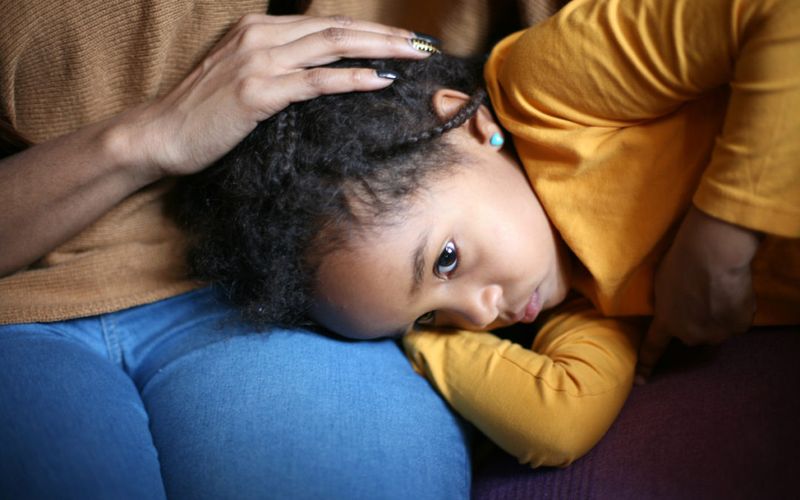Parents often aim to encourage and guide their children toward success, but words can sometimes inadvertently inflict emotional harm. Certain phrases, even when spoken with good intentions, can leave deep-seated emotional scars that contribute to hidden trauma in adulthood. Research has shown that language significantly impacts a child’s self-esteem, emotional development, and the internal dialogue they carry into adulthood. Understanding these effects is crucial for fostering healthier, more resilient individuals. By being mindful of the language used when communicating with children, parents can nurture a supportive environment that allows for emotional expression and growth. Here are 14 common phrases to be mindful of:
1. You’re too sensitive

A phrase like, “You’re too sensitive,” can resonate negatively with a child. This comment often makes them feel wrong for their natural emotional reactions. Over time, it encourages emotional suppression. These suppressed emotions can manifest as anxiety and emotional detachment in adulthood. Children thrive in environments where their feelings are acknowledged. Validating emotions builds confidence in expressing oneself. Recognizing sensitivity as a strength rather than a flaw is key. Emotional expression is essential for healthy development. Encouragement over dismissal fosters emotional resilience. A nurturing atmosphere promotes security. Self-awareness becomes a beacon of strength later in life.
2. Why can’t you be more like your sibling?

“Why can’t you be more like your sibling?” is a phrase loaded with comparison. It implies inadequacy, fostering feelings of resentment between siblings. Such comparisons can create lifelong insecurities and sibling rivalry. Individuality should be celebrated within families. Encouraging each child’s unique strengths helps build self-confidence. Children need affirmation and recognition for their own achievements. Comparisons undermine self-worth and fuel competition. Acknowledging each child’s talents nurtures a supportive environment. It reinforces their sense of belonging and acceptance. Love and pride should be unconditional, not based on comparison. This approach builds secure relationships and self-esteem.
3. Stop crying, it’s not a big deal

Dismissing a child’s tears with “Stop crying, it’s not a big deal,” can minimize their feelings. This phrase invalidates genuine emotions, teaching them to suppress rather than express. Emotional expression is a critical aspect of a child’s development. Children need to know their feelings matter. Minimizing emotions can lead to difficulties in emotional processing later in life. Encouragement to talk about feelings fosters openness and trust. Understanding and empathy are pivotal in supporting emotional growth. Creating space for emotional expression is vital. It aids in developing a healthy emotional framework, essential for adult relationships and self-awareness.
4. You’ll never be good at that

“You’ll never be good at that,” is a disheartening phrase. It can instill a fear of failure in a child. This discouragement can lead to a fixed mindset, where challenges are avoided. Belief in one’s potential is crucial for growth. Encouragement and support help build resilience and confidence. Children flourish in environments that celebrate effort over perfection. Failure is part of learning. Positive reinforcement promotes perseverance. This approach fosters a growth mindset and ambition. It empowers children to pursue dreams and set goals. Opportunities for exploration and creativity should be limitless. They’re integral for building competence and self-assurance.
5. I’ll do it for you

Taking over tasks with, “I’ll do it for you,” can stifle a child’s independence. It sends a message of inability to handle challenges. Children thrive when they are given responsibilities. Independence fosters confidence and self-efficacy. Empowering children to complete tasks builds competence. Support rather than control promotes autonomy. Mistakes are learning opportunities. Children need space to grow through trial and error. A supportive environment encourages problem-solving skills. Allowing children to try promotes trust in their abilities. It nurtures resilience and resourcefulness. Cultivating these skills is integral for later life. They’re essential for navigating adulthood’s complexities.
6. I’m disappointed in you

The phrase “I’m disappointed in you” can pierce a child’s self-esteem. It implies conditional love based on performance. Such words can cultivate guilt and shame. Children internalize these feelings, leading to low self-worth. Constructive feedback should replace disappointment. Highlighting efforts over results encourages growth. Affirming unconditional love fosters security. Positive reinforcement builds trust and acceptance. Genuine encouragement nurtures confidence and resilience. Mistakes should be viewed as learning experiences. They are opportunities for growth and improvement. Creating a supportive environment enhances self-awareness. It leads to healthier emotional development. Children need assurance of love, irrespective of achievements or failures.
7. Because I said so

“Because I said so” is a phrase that shuts down curiosity. It discourages questioning and understanding. Children are naturally inquisitive. Encouraging exploration and dialogue fosters critical thinking. Providing explanations enhances learning and comprehension. Respecting a child’s perspective builds mutual respect. It creates a foundation for open communication. Understanding the ‘why’ behind actions is empowering. It promotes cognitive development. A supportive environment encourages questioning. It nurtures analytical and problem-solving skills. Trust in a child’s reasoning builds confidence. Encouraging dialogue is key. It fosters a sense of autonomy and understanding. Knowledge is a powerful tool for growth and development.
8. You’re acting like a baby
Telling a child, “You’re acting like a baby,” can be shaming. It undermines their emotional experiences. Children need validation, not ridicule. Understanding developmental stages is critical. Age-appropriate behavior should be acknowledged and respected. Encouragement fosters emotional maturity. Compassion and empathy support healthy development. Acknowledging feelings is vital for emotional growth. Encouragement over criticism builds confidence. Children need space to express themselves. A nurturing environment promotes security and assurance. Emotional resilience is built through understanding and support. Cultivating empathy and compassion is essential. It leads to healthier relationships and self-awareness. Respect for emotions fosters a positive self-image.
9. You should be more grateful

“You should be more grateful” can unintentionally guilt a child. It suggests that their feelings of dissatisfaction are unjustified. Children need to express their emotions freely. Acknowledging their perspective fosters understanding. Encouragement to communicate feelings builds trust. Gratitude is developed through positive reinforcement. Understanding and empathy promote emotional growth. Children learn gratitude through example, not guilt. Open dialogue nurtures emotional intelligence. Validation of feelings encourages openness. Respecting emotions is key to building self-awareness. Children need space to develop authentic gratitude. A supportive environment enhances emotional expression. Empathy and understanding cultivate gratitude naturally.
10. You’re too much to handle

Hearing “You’re too much to handle” can be devastating. It implies that the child is burdensome. This message can lead to feelings of unworthiness. Children need to feel accepted and loved. Encouragement and patience foster security. Understanding a child’s energy and emotions is crucial. Empathy and support nurture resilience. Validating their feelings promotes confidence. Creating a positive environment builds trust. Children need assurance of acceptance. They thrive in environments of understanding. Encouragement over criticism fosters growth. Patience and empathy are fundamental. They support emotional development and self-esteem. Children need space to express their exuberance.

Well, hello there!
My name is Jennifer. Besides being an orthodontist, I am a mother to 3 playful boys. In this motherhood journey, I can say I will never know everything. That’s why I always strive to read a lot, and that’s why I started writing about all the smithereens I came across so that you can have everything in one place! Enjoy and stay positive; you’ve got this!

